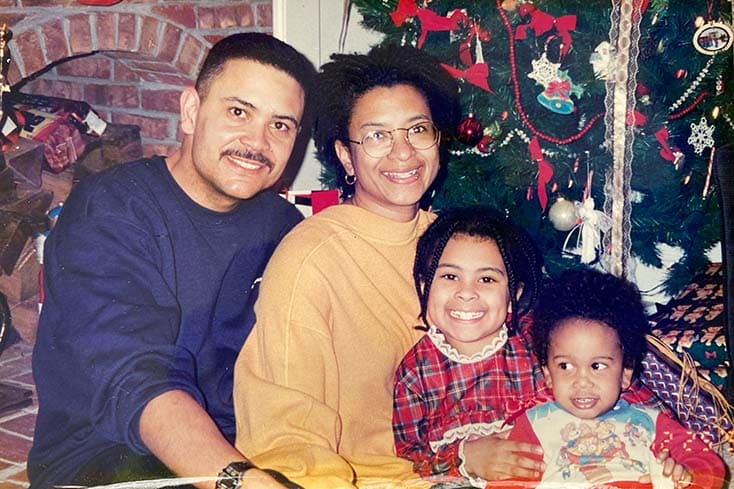December 20, 2021
By Daniel H. Gillison

Even though my mom passed away seven years ago, it still feels like yesterday. I was actually in the room when it happened. I was playing her a song when, suddenly, she suffered from a heart attack she wouldn’t recover from.
Christmas was my mom’s favorite time of the year; she loved spending time with family and watching her grandchildren open their presents. Ever since her passing, the holidays have never quite felt the same. So for me, the holiday season is always accompanied by a tinge of sadness.
And sadness can be challenging to cope with when all around you people are singing about how this is “the most wonderful time of the year.” How do you handle so many movies and ads broadcasting family and togetherness if you’ve lost a loved one or you feel all alone? What do you do with so many messages about everything being “merry and bright” when, in most places, it is quite literally cold and dark?
The truth is that, for many, this can actually be the most difficult time of the year. In 2014, NAMI found that 64% of people with mental illness say the holidays make their conditions worse. A 2021 survey showed that 3 in 5 Americans feel their mental health is negatively impacted by the holidays. And as we face a second holiday season during the COVID-19 pandemic, we know that more people than ever will be grieving someone or something during this time.
So if you find yourself feeling anxious for the holidays, you are certainly not alone. Here are a few steps you can take to prioritize your mental health during this hectic season:
1. Accept Your Feelings
The holidays can bring up a range of emotions for people. Sometimes you can even experience seemingly contradictory emotions all at once. Try your best to acknowledge and accept your emotions rather than place judgment on them. It’s OK to feel happy; it’s OK to feel sad; it’s even OK to feel both happy and sad. Give yourself compassion and allow yourself to sit with whatever you’re feeling.
2. Maintain Healthy Habits
For many people, the holidays lead to a massive disruption in your day-to-day routine. But maintaining healthy habits like going to therapy, getting enough sleep and exercising are critical to keeping your mental health on track.
3. Set Boundaries
People like to be generous during the holidays, but that generosity doesn’t have to come at the expense of having healthy boundaries. If hosting an event or buying an expensive gift is too stressful, it’s OK to say no. It’s also OK to limit the time you spend with family that you may have a complicated dynamic with.
4. Make Time to Connect
Connection and meaning are critical to our mental health. Make time for your important relationships and connect with yourself through self-care. You can even connect with loved ones who are no longer with you through a family tradition or a personal remembrance ritual. For me, every Christmas I try to find a quiet space where I can listen to the song that was playing when my mom died; and even though she is not physically present with me, I spend time talking to her.
I will always miss my mom during Christmas. But at the same time, I will always be thankful for the many Christmases I did get to spend with her, and I’m so happy that she is no longer in pain. This year, I’m reminding myself that it’s OK to still be grieving; at the same time, I don’t have to feel guilty about enjoying the holidays without her.
This holiday season — whether you find it to be the most wonderful or most difficult time of the year — I hope you’ll join me in taking care of your mental health by accepting whatever emotions come up, maintaining healthy habits, setting boundaries on stressors and making time for meaningful connection.
If you find yourself struggling with your mental health during the holidays, help is available: visit nami.org/help.
Holiday Mental Health Resources:
- Managing Your Mental Health During the Holidays – NAMI Blog
- Surviving Painful Holiday Emotions – NAMI Blog
- Avoiding Holiday Stressors: Tips for a Stress-Free Season – NAMI Blog
- Coping with the Holidays When There is Mental Illness – NAMI Maryland
- 9 Keys to a Resilient Holiday – Psychology Today
- 10 Realistic Ways to Set Boundaries With Others During The Holidays – HuffPost
- Mindfulness & Meditations for the Holiday Blues – Headspace
 Daniel H. Gillison, Jr. is the chief executive officer of NAMI (National Alliance on Mental Illness). Prior to his work at NAMI, he served as executive director of the American Psychiatric Association Foundation (APAF) in addition to several other leadership roles at various large corporations such as Xerox, Nextel, and Sprint. He is passionate about making inclusive, culturally competent mental health resources available to all people, spending time with his family, and of course playing tennis. You can follow him on Twitter at @DanGillison.
Daniel H. Gillison, Jr. is the chief executive officer of NAMI (National Alliance on Mental Illness). Prior to his work at NAMI, he served as executive director of the American Psychiatric Association Foundation (APAF) in addition to several other leadership roles at various large corporations such as Xerox, Nextel, and Sprint. He is passionate about making inclusive, culturally competent mental health resources available to all people, spending time with his family, and of course playing tennis. You can follow him on Twitter at @DanGillison.
Submit To The NAMI Blog
We’re always accepting submissions to the NAMI Blog! We feature the latest research, stories of recovery, ways to end stigma and strategies for living well with mental illness. Most importantly: We feature your voices.
LEARN MORE